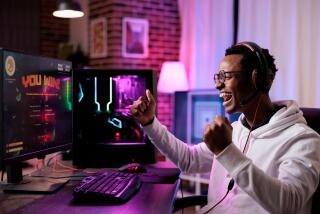Virtue in Junior’s Vice
- Share via
Caution to parents: Do not permit teenagers to read the following. Tell them newspaper editorials are like G-rated movies or home study for adults in a democracy.
OK, you know how you’ve tried to eliminate or reduce your teen’s video gaming by warning of the violent impulses, brain cancer, body odor, crossed eyes and other nefarious effects of indulging in such useless play that involves very loud, repetitious pretend racing, pretend hunting and pretend killing? Now, researchers at the University of Rochester in New York, in a study published in the journal Nature, report there’s good stuff that comes to those who play the games, potentially even postal workers. Another reason not to move to Rochester.
It seems that inveterate video gamers are sharper at tracking objects that appear simultaneously and at efficiently processing fast-changing material, even after being zombied in front of the video screen. This improved visual acuity occurs with only 10 hours of play by nonvideo players like, say, parents of teens, who must be trained to play these adult-like child games.
The study doesn’t address persistent fears that playing violent games encourages aggressive instincts in some. Nor, frankly, does it detail the social value residing within games depicting terrorists driving an electric drill into the neck of a kidnapped maiden. And it doesn’t explain how all those children who played cowboys and Indians with loud cap pistols did not become racist serial killers.
The researchers also can’t explain why visual skills improved so much after video game playing. But we can.
It’s called practice. Those researchers obviously didn’t grow up doing piano scales, building entire toy towns with Lincoln Logs or assembling huge Ferris wheels with Erector sets. Remember those little girders held together by the tiny nuts you had to screw onto countless little bolts, some of which ended up under a yowling dad’s bare foot that evening?
Obviously, we were improving digital dexterity through long hours in repetitious assembly. That, in fact, is how humans got so skilled with TV remotes. Same deal for video games preparing people for long office hours at video screens, which have become as much a part of American work culture as microwaves, cluttered shelves and pencils that always need sharpening.
Some baseball and hockey coaches have long urged young players to improve hand-eye coordination through video gaming. Now, it seems, games could also improve reaction time for would-be investors sneaking work time to monitor share prices of video game maker stocks on, of course, a video screen.


